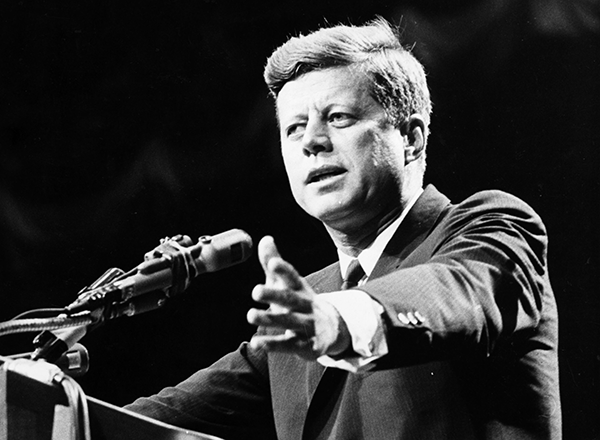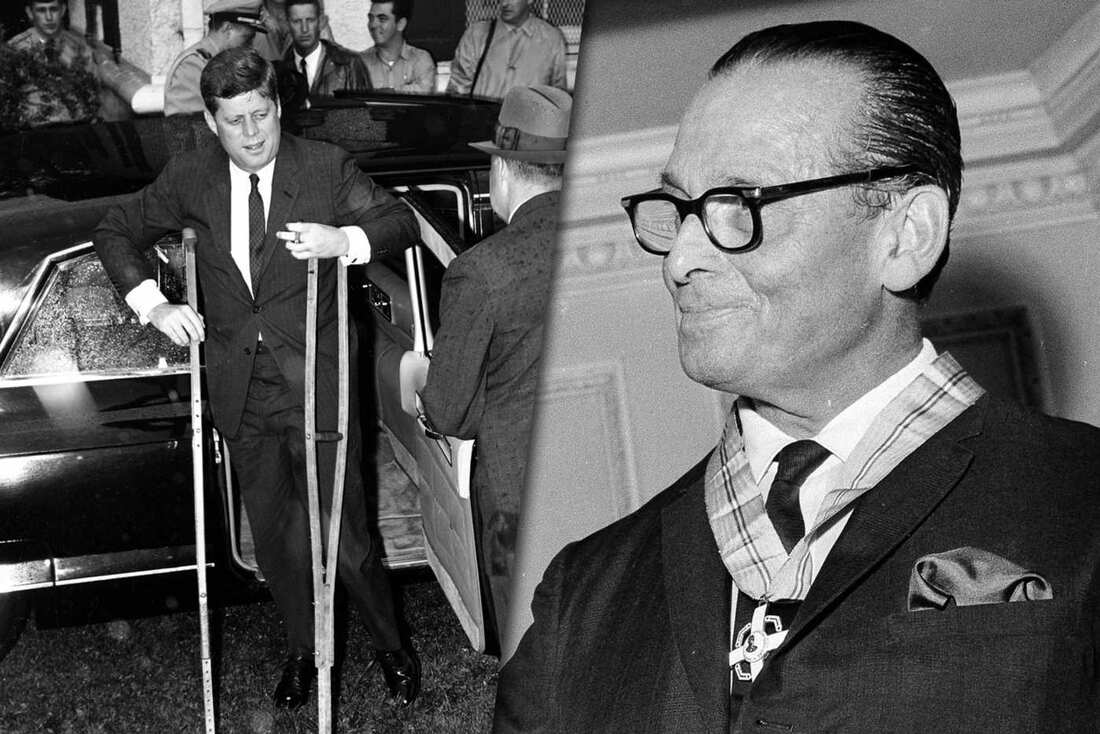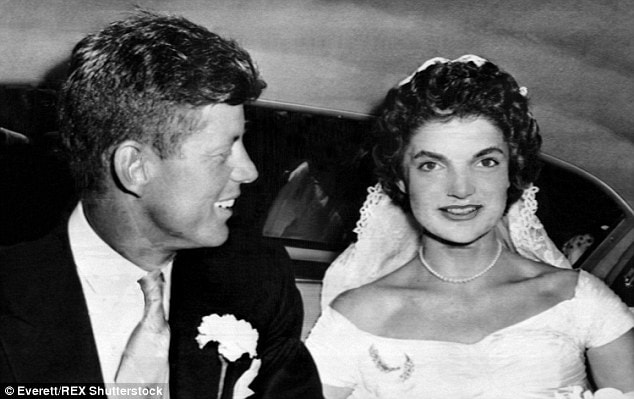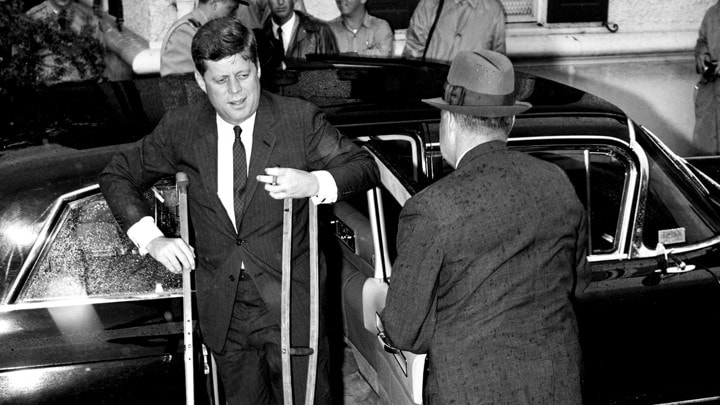
Throughout his career, John F. Kennedy struggled with back pain and with his legs, which led to a troubling drug problems and disease. Despite this, he was able to hold the country together when they needed it most, and push the limits of Americans in their darkest hour.
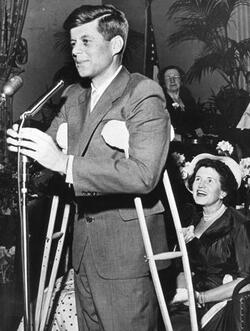
Kennedy was always on some type of drug. Whether it was opium or amphetamines he was always high to keep his pain away. In the beginning of his presidency he hired Max Jacobson as his ‘Doctor’. However. Mr. Jacobson had no degree as a doctor, nor did he have medical experience prior to his time with the president. Later in his career he would come to take on the name of Dr. Feelgood, despite the fact that he had no degree. “In a back room, he mixed up his medicines, sometimes passing the potions over magnets or boiling them in beakers with fluorescent stones. His concoctions contained vitamins, steroids, animal placenta, bone marrow—and a powerful dollop of amphetamines, the drug known on the street as “speed.” He injected these cocktails into hundreds of patients, including some of America’s most famous singers, actors and authors. His shots sent them soaring, flushed with energy, ecstasy and supreme self-confidence—at least for a while” (Carlson par 2.)Twice a week, Dr. Feelgood would come by and inject the President with a cocktail of drugs. Ranging from hard amphetamines to opium shots that would completely numb his back until the doctor returned for his next treatment. This continued throughout the duration of Kennedy’s presidency. Dr. Feelgood also loved bragging about his treatment of the President to his other patient which included multiple actresses and singers throughout the country. “Looking back,” Fisher wrote in a memoir, “it’s amazing how we all just accepted the fact that the President was taking Dr. Feelgood with him to a meeting that would affect the entire world” (Carlson par 8.)
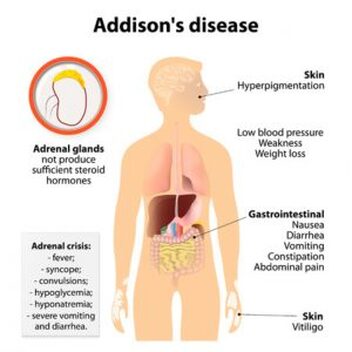
Kennedy’s drug problem is one of the best kept secrets in United States history. Surprisingly, whilst on TV, the President never showed any signs of difficulty speaking, nor did his body show any effects of the drugs that he was taking. However, on the inside the drugs were rotting him from the inside out. As a result of the potent drugs he was taking, he was diagnosed later in his Presidency with Addison’s disease. This disease prevents the body’s adrenal glands from producing. These glands produce the instructions of the bodily functions of nearly every organ in the body. The disease is incredibly rare, only affecting about 200,000 people each year in the United States. Addison’s disease rots the body from the inside out, shutting down organs one by one until the body can’t function anymore (Altman and Purdum par 1).
In Kennedy’s mind, he knew that he was sick, he knew that this disease would eventually kill him. He also knew that if the disease continued to progress that he wouldn’t live to see his full 8 years in office. However, the President somehow continued his duties to the American people and was able to do his job rather well, despite the fact that he was dying on the inside. Kennedy knew the importance of his presence in the office, on TV, and at rallies, and wouldn’t allow for his disease, back pain, nor drug side effect sway him from keeping the nation calm and confident in their President, and more importantly- their country.
Soon after the death of Kennedy, Dr. Feelgood became more and more insane. Created new concoctions of other crazy amphetamine combinations. There was no limit to what he would put into a dose. Surprisingly, his patients kept coming and even wanted more of what he was dealing out. This also begs the question of how many other actors, singers, and other entertainers were taking amphetamines on a daily or weekly basis. Not to mention the fact that the most powerful man in the world was also on some type of potentially fatal concoction around the clock which incredibly scary to think about for the American people at the time.
Kennedy’s Presidency was a milestone in the history of the United States. It gave the people hope for the future even in its darkest times. Even after being assassinated, the stigma of JFK would stick around for years to come. Even today when people refer to Kennedy, it’s never in a negative connotation. It’s always something positive about what he did for the country. Despite all the drugs, women, and depression, Kennedy was able to lead the country through the Cold War, and possibly save the world as we know it today. Kennedy might have had one of the most well kept secrets in United States history, but in the end he knew how to lead. At the time, that’s what was asked for, and that’s what he delivered. He will always be held as the golden standard for what a leader should be.
Citations:
The Acupuncture Clinic. Addison's Disease. The Acupuncture Clinic, www.theacupunctureclinic.co.nz/acupuncture-for-addisons-disease/. Accessed 27 Sept. 2019.
Altman, Lawrence K., and Todd S. Purdum. "In J.F.K. File, Hidden Illness, Pain and Pills" ["In J.F.K. File, Hidden Illness, Pain and Pills"]. NY Times, 17 Nov. 2002, www.nytimes.com/2002/11/17/us/in-jfk-file-hidden-illness-pain-and-pills.html. Accessed 24 Sept. 2019.
AP Photo. President Kennedy and Dr. Max Jacobson. 22 Nov. 2013. Intelligencer, nymag.com/intelligencer/2013/11/strange-saga-of-jfk-and-dr-feelgood.html?gtm=top. Accessed 27 Sept. 2019.
Carlson, Peter. "Jack Kennedy and Dr. Feelgood" ["Jack Kennedy and Dr. Feelgood"]. History Net, June 2011, www.historynet.com/jack-kennedy-dr-feelgood.htm. Accessed 26 Sept. 2019.
Certified Old Guy. Kennedy's "Report to the American People on Civil Rights": Fifty Years Ago Today. Certified Old Guy, certified-old-guy.com/2013/06/kennedys-report-to-the-american-people-on-civil-rights-fifty-years-ago-today2/. Accessed 27 Sept. 2019.
Daily Mail. Marriage mystery: Beloved First Lady Jacqueline Kennedy Onassis would have turned 86 on July 28, but 21 years after her death in May, 1994 a mystery still lingers over whether she was the first, or actually the second wife of President John Kennedy. Daily Mail, www.dailymail.co.uk/news/article-3154984/Was-JFK-bigamist-eve-Jackie-Kennedy-s-86th-birthday-mystery-president-married-Palm-Beach-socialite-lingers.html. Accessed 27 Sept. 2019.
Dallek, Robert. Kennedy's chronically bad back was only one of his enduring ailments. Here, he is heading to the presidential yacht in June 1961 to host the Japanese prime minister. The Atlantic, www.theatlantic.com/magazine/archive/2013/08/the-medical-ordeals-of-jfk/309469/. Accessed 24 Sept. 2019.
Getlen, Larry. "The Kennedy Meth" ["The Kennedy Meth"]. New York Post, edited by Larry Getlen, 21 Apr. 2013, nypost.com/2013/04/21/the-kennedy-meth/. Accessed 23 Sept. 2019.
JFK on Crutches. John F. Kennedy Presidential Library and Museum, www.jfklibrary.org/media/5146286.
Mayo Clinic Staff. "Addison's Disease" ["Addison's Disease"]. Mayo Clinic, www.mayoclinic.org/diseases-conditions/addisons-disease/symptoms-causes/syc-20350293. Accessed 26 Sept. 2019.
Stoughton, Cecil. Kennedy Speech. Boston, www.bostonmagazine.com/health/2017/07/11/jfk-health-problems/. Accessed 26 Sept. 2019.
